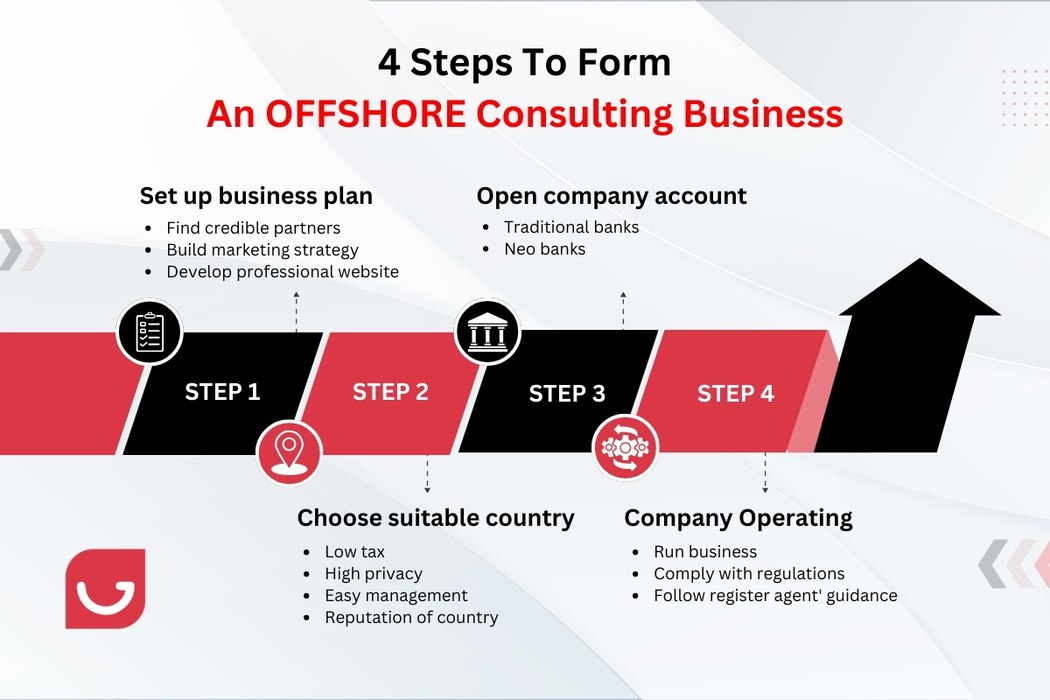Discovering the Services Offered in Offshore Firm Formations: What You Need to Know
Offshore business formations offer a series of solutions made to promote organization success while making certain conformity with lawful requirements. These services can consist of company registration, legal suggestions, and plans for privacy via candidate directors. Additionally, considerations around tax obligation optimization and property defense are important. Comprehending these elements can greatly affect one's decision-making process. The complexities of choosing the right territory and steering via policies increase better concerns. What should one consider following?
Recognizing Offshore Company Frameworks
What defines an overseas company framework? An overseas company is normally signed up in an international jurisdiction, commonly defined by favorable regulative environments and privacy. These structures are created to offer legal separation in between the company's possessions and its owners, enabling a series of monetary and functional advantages. Offshore firms can be established as numerous kinds, including minimal responsibility companies (LLCs), companies, or trust funds, relying on the governing framework of the chosen territory.
Secret attributes of these frameworks consist of enhanced personal privacy, asset defense, and simplicity of worldwide company purchases. In addition, they frequently call for minimal local presence and can facilitate the management of financial investments throughout boundaries. The selection of a specific overseas jurisdiction can substantially influence the functional capacities and conformity demands of the firm. In general, comprehending the details of overseas company structures is necessary for entrepreneurs and financiers looking for to optimize their organization strategies.
Tax Advantages of Offshore Business
Offshore firms use significant tax advantages that can improve profitability and economic effectiveness for organization proprietors. Among the primary benefits is the potential for decreased company tax obligation prices, which can be especially reduced than those in the proprietor's home country. Several overseas jurisdictions supply tax obligation incentives, such as tax obligation vacations or exemptions on certain sorts of earnings. Additionally, overseas business might take advantage of favorable tax treaties, permitting the reduction or elimination of withholding taxes on rewards, nobilities, and interest. This can lead to increased capital and much better reinvestment possibilities. Moreover, some offshore entities can operate under a territorial tax obligation system, which only taxes income generated within that territory. This framework can be particularly helpful for companies participated in worldwide profession or on the internet solutions, enabling them to optimize their tax obligation commitments while preserving conformity with international guidelines. On the whole, these tax obligation advantages can significantly add to long-term financial success.
Privacy and Discretion Functions
Exactly how can entrepreneur protect their sensitive info while taking advantage of global chances? Offshore business formations provide durable privacy and privacy functions that interest entrepreneurs looking for discernment (Offshore Company Formations). Lots of territories provide nominee services, permitting people to assign third events as investors or directors, therefore concealing their identities from public documents
Additionally, strict information security legislations in various offshore areas ensure that delicate information stays personal. Offshore business often gain from boosted banking personal privacy, with laws that safeguard client identities and economic purchases.
Additionally, using exclusive addresses for signed up offices lessens direct exposure to public analysis.
These privacy procedures enable company owners to run with higher confidence, knowing their sensitive information is safe. By leveraging these features, business owners can focus on critical development chances without the constant concern of details exposure.
Possession Defense Techniques
While steering through the complexities of worldwide organization, entrepreneurs should focus on possession defense to safeguard their wealth from possible dangers. Offshore firm formations offer durable techniques for minimizing direct exposure to lawful cases, financial institution actions, and political instability. One effective method involves establishing a restricted obligation firm (LLC), which separates individual possessions from company obligations, consequently supplying a shield versus lawsuits.
Additionally, entrepreneurs can use depend hold properties, guaranteeing they remain secured from lenders and lawful conflicts. Jurisdictions with strong asset protection legislations, such as Nevis or the Cook Islands, are usually favored for their desirable guidelines. Carrying out appropriate insurance coverage and branching you can try these out out financial investments further boosts safety, decreasing susceptability to market variations. Generally, using these methods within an offshore framework not just promotes wide range preservation however likewise cultivates lasting financial security, allowing business owners to focus on growth and development without undue worry over property exposure.

Opening Up Offshore Financial Institution Accounts
Opening up overseas savings account involves comprehending the different account kinds offered, which can accommodate various monetary requirements. Furthermore, the documents process is important, as it frequently requires details types of identification and evidence of house. This overview will certainly make clear the choices and demands for people and businesses looking for to develop overseas financial relationships.
Account Types Provided
Offshore bank accounts come in various kinds, each developed to provide to different financial demands and goals. Personal accounts are tailored for individuals looking for privacy and asset protection, while business accounts help with company deals and management of firm funds. Multi-currency accounts are popular among international investors, permitting deals across different currencies without extreme conversion charges. Additionally, interest-bearing accounts supply rate of interest on deposits, appealing to those seeking to expand their possessions firmly. Some financial institutions additionally give investment accounts, providing clients access to various investment chances. Each account kind might come with unique benefits and functions, allowing clients to choose the one that lines up ideal with their economic techniques and goals. Understanding these choices is essential for efficient offshore financial.
Needed Documentation Refine
To successfully open an offshore checking account, potential clients should prepare a collection of certain papers that please regulative needs. This typically includes a legitimate copyright or government-issued recognition to verify identification. Customers are likewise called for to supply evidence of house, such as an utility costs or bank declaration, dated within the last 3 months. In addition, a comprehensive description of the resource of funds is needed to assure compliance with anti-money laundering laws. Some banks might ask for a business strategy or referral letters, especially for business accounts. Each jurisdiction may have one-of-a-kind requirements; consequently, speaking with an expert in overseas services is advisable to establish all paperwork is full and exact, helping with a smoother account opening procedure.
Compliance and Governing Considerations
Maneuvering the complexities of compliance and regulatory factors to consider is crucial for any kind of entity pursuing overseas company formations. Entities must comply with various worldwide you could check here and neighborhood legislations that govern economic tasks, taxation, and corporate administration. Key policies often include anti-money laundering (AML) legislations, know your customer (KYC) procedures, and coverage requirements to guarantee openness.
Additionally, firms must stay cautious concerning modifications in regulation that might influence their operational status. Failing to comply can result in read more serious fines, including fines or the dissolution of the company. Engaging with monetary and lawful experts who focus on overseas regulations can provide critical support in steering via these intricacies.
Additionally, comprehending the ramifications of tax obligation treaties and global contracts is essential for maintaining compliance. Firms must focus on establishing durable compliance structures to alleviate dangers and guarantee lasting sustainability in their overseas endeavors.
Choosing the Right Offshore Jurisdiction
Exactly how does one establish one of the most appropriate overseas jurisdiction for firm formation? The selection of jurisdiction is critical and entails numerous elements. One need to analyze the legal framework and laws regulating business in prospective jurisdictions. Positive tax programs, such as low or zero business taxes, are frequently a key consideration. In addition, the political stability and credibility of the jurisdiction play significant roles in guaranteeing the protection of assets and compliance with worldwide criteria.
Additionally, the ease of access of banking solutions and the convenience of working should not be neglected. A jurisdiction offering durable discretion stipulations can likewise be advantageous for those looking for personal privacy. Ultimately, assessing the costs linked with company development, maintenance, and potential legal fees is necessary. By weighing these elements, one can make a notified decision, ensuring that the selected offshore territory straightens with their company objectives and operational needs.

Often Asked Questions
For how long Does the Offshore Firm Formation Refine Typically Take?

The overseas company development process usually takes anywhere from a few days to numerous weeks. Offshore Company Formations. Elements influencing this timeline include territory, documents efficiency, and particular company involved in the formation process
What Are the Preliminary Expenses Associated With Setting up an Offshore Firm?
The initial expenses for setting up an offshore company can differ widely, generally incorporating enrollment fees, lawful costs, and added fees for services like bank account configuration and compliance, usually completing numerous hundred to several thousand dollars.
Can Individuals Type Offshore Companies Without Expert Help?
Individuals can practically develop offshore business independently; nevertheless, they typically encounter complicated legal and regulatory needs. Offshore Company Formations. Expert aid is suggested to browse these challenges efficiently and assure compliance with appropriate legislations and policies
What Files Are Required for Offshore Firm Registration?
The records needed for offshore company enrollment commonly consist of recognition proof, a comprehensive company plan, evidence of address, and, in some jurisdictions, a statement of beneficial ownership and resolutions from supervisors.
Exist Recurring Upkeep Charges for Offshore Business?
Continuous upkeep costs for offshore business are normally required to guarantee conformity with neighborhood laws. These fees may consist of annual revival costs, registered representative solutions, and accounting, differing by territory and particular business structure.
